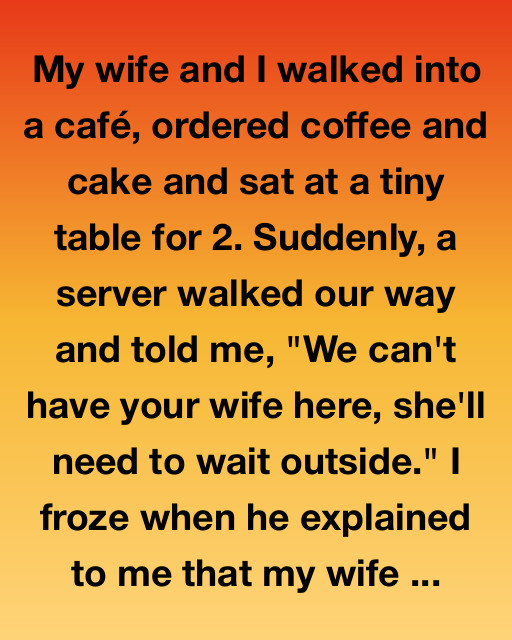We’d barely sat down—two coffees, one slice of carrot cake between us—when a server stopped at our tiny table and said, “I’m really sorry, sir… but your wife can’t be here.”
For a second I thought he was joking. Ana’s the last person you’d picture getting banned from a café. But the kid’s face was pale and sincere. “Manager’s orders,” he added, lowering his voice. “She was caught stealing from the tip jar. Said it happened more than once.”
The word stealing didn’t fit in my head with my wife’s name. We left without a scene. Outside, the air had that crisp autumn bite, and the sidewalk sounded like crushed leaves underfoot. In the car I asked, quietly, “Is it true?”
“Yes,” she said.
No excuses. No tears. Just the truth landing between us with the weight of something we hadn’t wanted to name. She told me it had happened three times, months back, when we were behind on rent and then the washing machine died and then the car coughed up a new kind of problem. “Twenty dollars the first time,” she said. “I felt sick for days. I promised myself never again. But I kept thinking I’d pay it back. I was ashamed to tell you.”
I remembered that month. The way we counted out coins for groceries. The way we sold things we liked and pretended we didn’t. Shame is a fast and private thing; it doesn’t always look desperate from the outside.
I slept on the couch that night. Not out of punishment, but to be alone with the noise in my head.
In the morning she left a note: I’m going to try to make things right. Don’t wait up.
Late afternoon, the café manager called. Evelyn. She said Ana had come in with an envelope and a letter, apologized, and asked them to accept repayment. “Not many people do that,” Evelyn said. There was no triumph in her voice—just a surprised kind of respect.
Ana came home at six looking wrung out and lighter at the same time. She told me how the guilt had sat on her chest for months. Why she avoided that part of town. Why she’d stopped suggesting coffee dates. The secrecy had punished her more efficiently than any ban could.
We went back to counseling. The counselor asked me once, “Do you think you’ve forgiven her?” I said, “Yes. Not because I should, but because she didn’t run from it. She owned it.”
Life settled into something steadier. Ana got a part-time job at a nonprofit thrift store. On Fridays she’d slip a five into a sealed envelope marked karma jar. When I asked, she smiled. “When it’s full, I’ll leave it for their tip jar. No note, no name.”
A year later, the café posted a photo on Instagram: a thick envelope and a handwritten line—For your kindness, from someone who’s learning. The comments were full of second chances. Ana didn’t say a word. She didn’t have to. We both knew.
Then Evelyn called again. They were opening a second location and wanted Ana to help build a community program—free workshops for people in tight spots. “She’d be perfect,” Evelyn said. Ana cried when she heard. Banned to invited back felt like the distance between punishment and purpose.
She started a monthly support circle there. People came and told the worst thing they’d done out loud, and then they didn’t die of it. One evening a girl named Talia stayed after. Barely eighteen, hands shaking. She’d been caught stealing at work and didn’t know how to fix her life. Ana told her, “It’s not about being perfect. It’s about taking the next right step.” Talia cried like someone had opened a window.
The café gave Ana a small plaque for the wall: Broken crayons still color. She hung the same phrase in our kitchen. I pass it every morning and think about the way a marriage absorbs a mistake—not by pretending it never happened, but by building something around it that holds.
We still don’t go to that first café together. Not because we can’t, but because the story has moved on. The real twist wasn’t a public shaming or a dramatic confrontation. It was the quiet, inconvenient work of repair. Ana didn’t become someone different overnight. She became more herself by telling the truth, paying it back, and then paying it forward.
If you’re carrying a heavy secret, start where you are. Small, messy, honest. Own the harm. Make amends. Then turn the lesson into a hand you offer the next person who’s slipping. Some days life is just a series of stumbles. If you’re lucky, you learn how to get up—and how to reach back.


